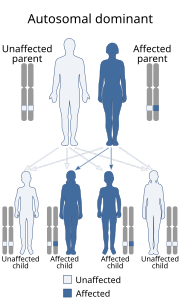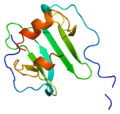(cluster of differentiation 184) is a protein that in humans is encoded by the CXCR4 gene. The protein is a CXC chemokine receptor. CXCR-4 is an alpha-chemokine...
22 KB (2,658 words) - 17:27, 24 April 2024
A CXCR4 antagonist is a substance which blocks the CXCR4 receptor and prevent its activation. Blocking the receptor stops the receptor's ligand, CXCL12...
3 KB (388 words) - 15:47, 30 April 2024
receptor, CXCR4, for entry. Dual-tropic HIV-1 strains are thought to be transitional strains of HIV-1 and thus are able to use both CCR5 and CXCR4 as co-receptors...
125 KB (14,342 words) - 15:53, 2 May 2024
CXC chemokine receptors (section CXCR4)
has three highly related ligands in mammals, CXCL9, CXCL10 and CXCL11. CXCR4 (also known as fusin) is the receptor for a chemokine known as CXCL12 (or...
9 KB (885 words) - 07:16, 30 April 2024
from autosomal dominant mutations in the gene for the chemokine receptor, CXCR4, resulting in a carboxy-terminus truncation of the receptor of between 10...
9 KB (1,013 words) - 15:45, 30 April 2024
marrow through a CXCR4 dependent mechanism. CXCR4, previously called LESTR or fusin, is the receptor for CXCL12. This CXCL12-CXCR4 interaction used to...
26 KB (2,930 words) - 15:49, 11 April 2024
partial agonist) of the alpha chemokine receptor CXCR4 and an allosteric agonist of CXCR7. The CXCR4 alpha-chemokine receptor and one of its ligands,...
17 KB (1,672 words) - 09:12, 17 May 2024
development. HIV-1 most commonly uses the chemokine receptors CCR5 and/or CXCR4 as co-receptors to enter target immunological cells. These receptors are...
67 KB (7,844 words) - 14:24, 25 March 2024
alpha-chemokine receptor, CXCR4, for entry. These strains are now called X4 viruses. The alpha-chemokine SDF-1, a ligand for CXCR4, suppresses replication...
5 KB (616 words) - 05:06, 28 February 2022
mutation in MYD88 (90% of patients) and a somatic mutation in CXCR4 (27% of patients). CXCR4 mutations cause symptomatic hyperviscosity syndrome and high...
58 KB (5,753 words) - 22:23, 4 April 2024







